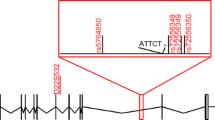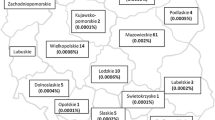Abstract
Machado-Joseph disease (MJD) is an autosomal dominant spinocerebellar degeneration originally described in families of Portuguese-Azorean ancestry. The hypothesis that its present world distribution could result from the spread of an original founder mutation has been raised. To test this possibility we have conducted a linkage disequilibrium study of markers segregating with the MJD1 locus in a total of 64 unrelated families of different geographical origins. Significant association was detected between the MJD1 locus and marker alleles at loci D14S280, D14S1050 and D14S81. All affected individuals, except one Chinese family, had allele 3 (237 bp) at D14S280. This finding is consistent with a founder effect in our MJD population. However, distinct haplotypes were observed in patients originating from the two Azorean islands showing the highest disease prevalence; therefore, the possible existence of more than one founder mutation can not be excluded with the markers currently available.
Similar content being viewed by others
Author information
Authors and Affiliations
Additional information
Received: 27 February 1996 / Revised: 4 June 1996
Rights and permissions
About this article
Cite this article
Gaspar, C., Lopes-Cendes, I., DeStefano, A. et al. Linkage disequilibrium analysis in Machado-Joseph disease patients of different ethnic origins. Hum Genet 98, 620–624 (1996). https://doi.org/10.1007/s004390050270
Issue Date:
DOI: https://doi.org/10.1007/s004390050270




